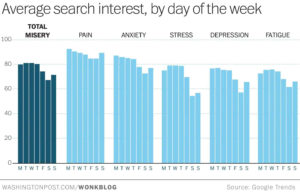It’s springtime. The weather has turned and the sense of renewal is in the air. Beautiful flowers, tree buds, mowed lawns all signal the rejuvenation of flora and fawna. You may be experiencing the sensation of renewal as well. Longer days mean more outdoor activities, more engagement with others, and more vitamin D!
Increased Anxiety in April? Big Time.
You may find it ironic that April is the second highest month on the “Misery Index” (right after March). The Misery Index combines internet searches for terms depression, anxiety, pain, stress and fatigue. In fact, a study in 2014 showed April had the highest spike of any month!
Note this chart below that shows Mondays (then Tuesdays and Wednesdays) as the most challenging day of the week for individuals searching these terms:

While “pain” can relate to actual injury and muscle fatigue outside of emotional pain – i.e., “best cream for muscle pain” – there is little mistaking searches for “anxiety.” Note how anxiety receives considerably more searches than depression.
Why April?
We have noted in recent posts how “anxiety is the new depression.” But with spring literally in the air, how does anxiety take such a hold on us at this time of year?
Our bodies and minds can be resilient. We can withstand a lot. But winter months can be really challenging for many of us. Stress and anxiety from the holidays can build up. Pressure of family coming into town, pressure to give gifts, pressure to prepare meals with high expectations, time off from work with pressure to catch up, New Year’s resolutions that have become difficult to keep…
Whew! It can all catch up with us in March and April. Have you been feeling more anxiety, stress, irritability or fatigue in April? Not sure why? It could be the accumulation of months of harboring inner pain and anxiety.
What Can I Do If I’m Still Feeling Anxiety?
In our articles, you read me encouraging those who are struggling to make a call to our admissions team. Anxiety and depression and absolutely treatable – yet only about 3 in 10 ever seek help. And each month we have clients who consistently say “I wish I would have called earlier…I carried around this pain much longer than I should have.”
A conversation with a specialist can help you understand if you truly will benefit from a treatment program. We can explain how it works, how your insurance can cover most of your treatment costs, and what your days will be like. Call today for a free evaluation. 888.771.5166.
Professional Health Tip from Dr. Gregory Jantz…
To help reduce anxiety, avoid “Hot Spots.” You likely know what can trigger your anxiety. Be purposeful about avoiding the situations or individuals that have proven to cause you anxiety. That may not always be possible with spouses or partners, family members or business associates. But you can create an environment that fills your time with more positivity and purpose, enabling you to spend less time in more stressful situations. If you are in those situations, you may not be able to control the other person, but you can controls your own thoughts. Remind yourself that you will not let words or actions of another dictate your calmness and peace. Be thoughtful, and allow words and actions to dissipate quickly.
Dr. Gregory Jantz is the founder of The Center • A Place of HOPE in Edmonds, Washington, voted a top ten facility for the treatment of depression in the United States. Dr. Jantz pioneered Whole Person Care in the 1980’s and is a world-renowned expert on eating disorders, depression, anxiety, technology addiction, and abuse. He is a leading voice and innovator in Mental Health utilizing a variety of therapies including nutrition, sleep therapy, spiritual counseling, and advanced DBT techniques. Dr. Jantz is a best-selling author of 37 books and has appeared on CBS, ABC, NBC, Fox, and CNN.
Related Posts
Fear Versus Anxiety
By: Hannah Smith • Updated: December 13, 2021
Do you know the difference between fear and anxiety? If you look in the dictionary or ask most people, these words are often used interchangeably. However, there is an important distinction between them. To understand, let’s consider Janet and Marc. The sun was just beginning to peek through the blinds...
How to Tell if Someone Is Gaslighting You
By: Dr. Gregory Jantz • Updated: December 18, 2024
Gaslighting can undermine your sense of reality. Learn to recognize the signs, understand its impact, and discover empowering strategies to protect yourself and rebuild confidence in your perceptions and experiences.
What are the Long and Short Term Effects of Anxiety?
By: Dr. Gregory Jantz • Updated: December 10, 2024
Anxiety is a mental health issue experienced by an increasing number of people. According to the Anxiety and Depression Association of America, anxiety disorders are the most common mental illness in the U.S., affecting 40 million adults (19.1% of the U.S. population) age 18 and older every year. Anxiety disorders...
Get Started Now
"*" indicates required fields
Whole Person Care
The whole person approach to treatment integrates all aspects of a person’s life:
- Emotional well-being
- Physical health
- Spiritual peace
- Relational happiness
- Intellectual growth
- Nutritional vitality